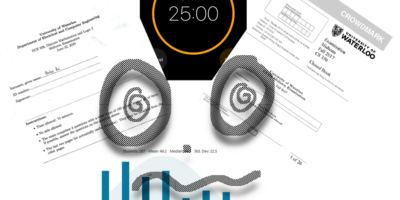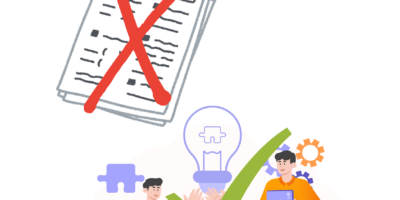Knowledge has been written onto surfaces for eons, first on clay tablets, then slates and papyrus, cat guts and various skins. With the invention of the Gutenberg press, books became widely available for even the layman. Especially now with huge printing machines, knowledge embodied in paper has become more accessible, with multiple versions. Textbooks are a very important resource to have and to refer to throughout your course. Often times, professors will assign practice problems from outside sources and their lectures notes can be sufficient but having the textbook is a great way to increase your understanding of the course material. Now with the rise in of electronic devices, PDFs and online access to the same textbooks are being more and more available often at a fraction of the cost. Electronic copies of the textbook can be a convenient way of accessing the knowledge but physical copies of textbooks are a tried and true way for studying. Rather than using electronic books, or e-books by the current vernacular, students should continue to buy textbooks from the university book store and consider the cost an investment in their future.
In all the courses at the University of Waterloo, textbooks are often assigned or recommended by professors and instructors to either supplement or reinforce the material being taught in class. As students, we do not have unlimited funds to pay for housing, food, and school supplies and must pick and choose how we spend our money. Textbooks should be a cost taken into consideration when budgeting for the school year but with textbooks costing an upward of $200 per book per course, students often consider the purchase of online access to textbooks for less than 40% of the cost. As convenient as it is to use electronic copies, these electronic books, online access and PDFs copies of textbooks are not always available. Textbooks on the other hand are widely accessible; you can buy them in the university book store, Amazon and even inexpensive international versions from AbeBooks. If you do not mind buying second hand copies, there are many resellers of textbooks on Facebook, Craigslist and Kijiji. Following these steps help to further reduce the cost of your textbook expenses. The only way of legally accessing electronic copies of textbooks would be if the textbook publisher decides to sell the access and many times the publisher does not make that available. When you are done with the course, you can resell the physical text book to other students or to the used book store and partially recover the initial cost of the book. By buying books and reselling them, you are helping other students by providing lower cost textbooks and help keep money in your pocket and beer in your fridge.
Physical copies of textbooks are great, they are the closest thing to holding knowledge in your hands, other than the Internet. Additionally publishers often update and publish new editions of textbooks while keeping the content the same. By jumbling around chapters and practice problem numbering, they make old editions less usable than the brand new edition. Why not use this to your advantage and buy the old edition? Copies of old editions of textbooks can be purchased at a very low cost and will contain the same information as its successor with very little changed. If the professor only assigns readings from the textbook, buying the old edition and following along with the numbering or matching up with a friend who did buy the new edition can be an inexpensive way of accessing the material required. When you are finished with the book, the used book store may not buy it back but you can always keep it on hand. Textbooks are always a great resource to have as engineers, to refer back to or to refresh those basic skills used in the work place.
One of the problems with PDFs and electronic access to textbooks is that they require some sort of electronic device to view the material. While the devices are lighter and portable, these devices also have Internet access and cause many distractions in class and during studying time. With textbooks, there are no distractions and you can work effectively and study efficiently. With no batteries or system updates, books can survive indefinitely with proper treatment and care. Textbooks cannot be destroyed easily while PDFs can be deleted and the access to online textbooks can be lost after the term is over. With PDFs and online access to textbooks, the files are kept hidden away in various folders on the computer or electronic device. Without constantly seeing the textbook, you will forget to open it and read it even after purchasing the access. On the other hand, you can keep the textbooks on display to show how smart and well-read you are and be constantly reminded of the impending assignment deadline.
Finally, studies have shown that people read slower, less accurately and less comprehensively on screens than on paper. Comparing studies done in the 1980’s on the topic of reading speed, comprehension and accuracy on a video display terminal (VDT) versus paper-based text, it was found that silent reading from a screen was significantly slower than reading from paper. The evidence suggested that the difference in reading speed between reading on paper and reading on screen was between 20% to 30%. The accuracy of reading on a VDT proved to be lower than on paper. In one of the studies, readers compared two versions of hypertext and a paper copy of a document on winemaking. The measure of accuracy taken was the number of answers correctly made to a set of questions seeking information to be found in the document. They reported that readers of the hypertext were significantly less accurate in answering the questions than the paper-based readers. One of the most important aspects of reading is comprehension, especially for a university setting. The studies measured reading comprehension by asking subjects to read short passages from the screen and from paper and measured the reading time and comprehension. The examination of the results showed that people reading from the virtual based text was at a considerably higher disadvantage in reading comprehension and speed than those reading paper based text.
While electronic access to textbooks can be more portable and more inexpensive than buying new copies of textbooks, there are many more cost effective alternatives to purchase physical textbooks and clear academic advantages to purchasing physical textbooks. Readers, please do not participate in illegal activities; I do not recommend pirating books or supporting pirating efforts. Remember, you wouldn’t download a car would you? Then why would you illegally download a $200 textbook?




Leave a Reply